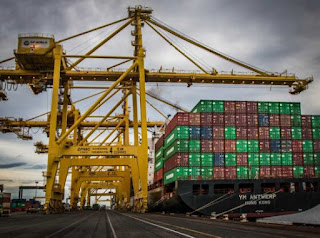Are Tariffs Good for America?
The May 13 meeting of the Fairfax Alliance featured an open conversation circle regarding tariffs. The Alliance posted several short primers on tariff history as advance reading with hard copies provided at the meeting for reference. The discussion topics focused on how attendees would suggest applying tariffs strategically.
There were several areas of conversation regarding both the implications of broad-based tariffs on a variety of stakeholders including the US Treasury, US consumers, and businesses both domestic and abroad. There was broad consensus that the current volatile, reactionary environment is not a sustainable approach, although there were differing opinions as to whether the Trump administration will be successful in using volatility as a negotiating strategy. The conversation noted that tariffs implemented by Congress would provide a more stabilizing approach simply due to the deliberative process involved, yet recognition that tariff application seems to be one of the authorities Congress is not opposed to delegating to the Executive.
There was also constructive commentary about what types of industries might best justify the application of tariffs to promote national interests. Some interests were proactive, to promote economic development; or defensively, to improve national resilience in preparation for shocks to global trade such as prompted by COVID-19. A discussion of food security exemplified the complexities involved. The US can likely provide enough calories for its residents. Some healthy food products might benefit from tariff-protections (fish and fruits/vegetables were noted). On the other hand, while coffee is widely considered a staple, it’s a tropical resource impractical to “produce” in the US. Other products where strategic tariff support seemed appropriate included rare earth minerals and chips (for both consumer and defense technologies), clean energy (to promote domestic R&D), and pharma/meds (to reduce global supply chain reliance). There was also interest in applying tariffs to offset other questionable practices regarding data privacy and security (concerns regarding the data-mining practices of companies like Temu).
The conversation turned toward how individuals can weigh in more directly on complex topics such as these and 5 Calls was suggested as a useful resource.
ANNE’S raw notes
Our questions:
What are the pros and cons of increasing the power of the executive branch to negotiate tariff deals?
How do you feel about the executive branch bypassing the organizations and mechanisms created to coordinate. (Both True and Biden did this.)
What would you prioritize strategically?
Discussion of taxation structure e.g. taxing production rather than consumption.
Do we want to manufacture clothes?
What about the global supply and manufacturing chain? Japan is fairly self-sufficient.
Discussion of national security - what is it, what does that mean?
Discussion on circular economies.
USA has a carbon advantage
How much of Trump’s actions are hurting his base?
Credibility of the US is broken - we are no longer a trusted partner
Strategy priorities:
Data and privacy
Public health supply chains
Food supply
Technology
Clean energy and regulations for energy waste
“We’ve fallen into the trap of describing the tool - tariffs - as its use, but that’s backwards.”
Reference. https://5calls.org - how to effectively reach representatives on issues you care about.
DAN’s raw notes
Kickoff
Anne – welcomes
Tea tax
Production / consumption discussion
Three dimensional chess strategy
Don’t we want foreigners to take our cash and invest it in American land/buildings/etc.
Lack of clarity
What are the strategic goals for tariffs (we won’t make clothes)
Japan example of self-sustaining; US may be not appreciative of currently-outsourced jobs/industries
Concern about quick changes and lack of explanation, as well as concerns about insider trading whether intentional or not
American co – higher salaries or profits?
Foreign pollution fee – US carbon efficiency – more regulations than China in general; EU depends more on sector
Types of tariffs we’d support?
Dollar store / TEMU – issue of data security / privacy
Issue of reciprocal/defensive versus supply chain
Pharma / meds
Agriculture for food supply (protection means….?)
Metals and mining
Clean energy – solar panel discussion
Chips (Taiwan)
Linkage to crypto / stability of dollar (devaluation makes debt less)
How much “move fast / break things” is OK before support slips?
Attack on China’s economy / backfiring due to international realignment?
Issue of trust with international allies
American elections too important to leave just to Americans
Public / private sector division of labor (public sector can’t make money)
Lack of transparency is part of chaos strategy
New administrations always have new alliances
Who within US cohorts benefits from tariffs? Agricultural backfired (2016)
How does Trump’s base react?
Challenge – while Executive actions are too fast/imprecise,
Question of government versus private innovation
Question of food security - calories versus coffee
Value of trade schools / apprentices rather than training
Our consumer society rewards cheap, disposal purchases / planned obsolescence
Ownership of issues like regulating long-term life-cycle
Politics
How do we change the system?
Campaign finance reform
Bipartisan system
UpVoteVA.org on RCV
Where does development of strategy live?
Government, people,
How do we get involved with our electeds (time constraint)
Legislators on speed dial – even for things you think you’re aligned with them on.
5calls app
If not a constituent, find someone in their district to lobby them to call
Join or die documentary on social capital (Netflix) – Rumi Forum – screening in September
Does BA have a guide on involvement / advocacy?
501-c-3 v c-4; what happened to the Election Reform report?

